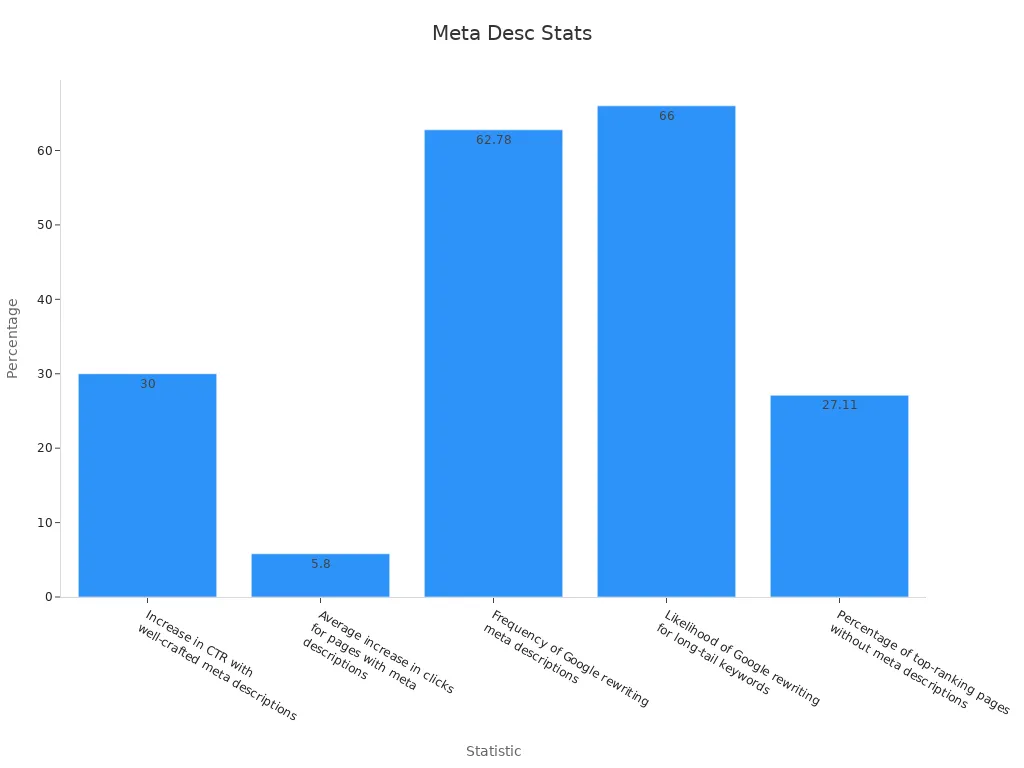Why Meta Descriptions Matter for SEO Success

Meta descriptions are important for bringing visitors to your site. These short summaries can boost clicks by up to 30% if done well. People choose to click when the description is interesting and useful. A good meta description matches what users are looking for. This helps keep them engaged and improves your search ranking. Search engines also check these descriptions to see if your page is relevant. Well-written meta descriptions can raise clicks by up to 200%. This makes them a big part of your SEO plan.
Key Takeaways
Meta descriptions can boost clicks by up to 30%. Write catchy summaries to bring in more visitors.
Keep meta descriptions between 70 and 155 characters. This helps them show fully in search results.
Use active words and clear actions. Phrases like 'Learn more' make people want to click your link.
Update your meta descriptions often to match new trends. Fresh descriptions keep your content interesting and useful.
Don’t use too many keywords. Stick to one or two main ones to make your descriptions simple and reliable.
The Role of Meta Descriptions in SEO
How Meta Descriptions Improve Click-Through Rates
Meta descriptions help bring people to your website. When someone searches, they often pick a link based on the description. A good meta description works like a small ad. It convinces users to click your page instead of others. This improves click-through rates, which show how many people click your link out of those who see it.
Studies say good meta descriptions can boost clicks by 30%. For example, a clear description that matches what users want makes your page stand out. Google sometimes changes meta descriptions, especially for long searches. But writing a strong summary increases the chance your version is shown. This helps your message reach more visitors.
Statistic Description | Value |
|---|---|
Increase in CTR with well-crafted meta descriptions | 30% |
Average increase in clicks for pages with meta descriptions | 5.8% |
Frequency of Google rewriting meta descriptions | 62.78% |
Likelihood of Google rewriting for long-tail keywords | 66% |
27.11% |
A high click-through rate tells search engines your content is useful. This makes meta descriptions an important part of SEO.
Enhancing User Engagement with Relevant Meta Descriptions
Good meta descriptions do more than just get clicks. They also help users stay on your site. If your page matches the description, people are more likely to explore. This lowers bounce rates and keeps users on your site longer. Both are good for search engine rankings.
For example, a 2023 study found that pages with matching keywords in their descriptions had 11% more clicks. This shows how important it is to match your description to what users want. By meeting their needs, you create a better experience that keeps them interested.
Think of a meta description like a first handshake. It’s the first thing users see about your content. A good description builds trust and makes them want to learn more.
The Indirect Impact of Meta Descriptions on Rankings
Meta descriptions don’t directly affect rankings, but they help in other ways. Google says meta descriptions don’t change rankings. However, they can improve click-through rates and user engagement, which do matter for rankings.
Experts like Brian Dean and Rand Fishkin say good descriptions bring more visitors. More traffic and engagement show search engines your content is valuable. Over time, this can improve rankings. Danny Sullivan from Google also says better descriptions lead to more clicks, even if they don’t directly change rankings.
"Meta descriptions are like ads—they don’t raise rankings, but they bring traffic," says Rand Fishkin.
By writing strong meta descriptions, you can make your site more visible. This makes them a key part of your SEO plan.

Characteristics of Effective Meta Descriptions
Best Length for Meta Descriptions
The length of a meta description is very important. Search engines show descriptions between 50 to 160 characters. Staying in this range makes sure your description is fully shown. This helps users read and understand it easily. If it's too short, it may not give enough details. If it's too long, it might get cut off, leaving users confused.
Try to keep your description between 70 to 155 characters. This fits well within the size limits and keeps it clear. A good length makes your summary easy to read and interesting. Remember, the right length helps make your meta description effective.
Matching Content and User Needs
A meta description should match your page content and user needs. When users see a description that fits their search, they click more. This builds trust and gives them a better experience. Studies show good descriptions can raise clicks and even lead to more sales.
To do this, focus on the main points of your page. Write descriptions that answer what users are looking for. Avoid being too general or unclear. Instead, share the most important details. This not only gets clicks but also keeps users on your site longer.
Using Keywords Smartly
Keywords help your meta description show up in searches. Placing them well makes your page seem more relevant. But don’t overuse keywords, or it will look bad. Too many keywords can make your description seem fake or spammy.
Put your main keyword near the start of the description. For example, if your page is about "healthy recipes," you could write, "Find healthy recipes that are quick and simple to make." This way, your description is both helpful and search-friendly. Using keywords wisely can bring more visitors to your site.
Using an Engaging and Actionable Tone
Writing meta descriptions that connect with users is important. A good tone makes people want to click your link. It helps your page stand out from others. But why does this matter for SEO? Let’s explain.
Grabs Attention Instantly
People scan search results quickly. Boring descriptions often get skipped. An exciting tone catches their eye. For example, instead of "We offer travel tips," try "Plan your dream trip with expert travel advice today!" This makes readers curious and interested.Encourages Action
Action words push users to click your link. Phrases like "Learn more" or "Start now" guide them to act. These words create urgency and make them want to explore your page.Builds Trust and Relevance
Matching your tone to what users want builds trust. For example, if someone searches "easy dinner recipes," write "Quick dinner ideas your family will enjoy." This shows your page fits their needs and feels personal.
Tip: Use words that solve problems or spark curiosity. For example, "Need help with SEO? Try these tips to improve rankings."
Using a strong tone improves clicks and user happiness. This small change can boost your site’s success. Write descriptions that connect with your audience and inspire action.
Best Practices for Writing Meta Descriptions

Use Active Language to Drive Action
Active words make your meta descriptions more exciting and useful. Using verbs like "Discover," "Learn," or "Explore" grabs attention fast. These words make users curious and eager to click your link.
For example, instead of saying, "We share SEO tips," try, "Boost rankings with expert SEO tips today!" This small change makes your description more lively. Studies show action words can increase clicks a lot. Businesses using this method often see more visitors and better results.
Active language also shows why your page is helpful. When users see how your content solves their problems, they want to learn more. This builds trust and encourages them to visit your site.
Tip: Use words that spark curiosity or action. Phrases like "Try now" or "Start exploring" make your descriptions stand out.
Include a Clear Call-to-Action
A call-to-action (CTA) tells users what to do next. CTAs like "Learn more today" or "Get started now" guide users to click your link. They make your description feel like a mini ad, which boosts engagement.
For example, Help Scout uses CTAs like "Get started for free" to attract users. This not only increases clicks but also improves conversions. A clear CTA helps users decide quickly and makes your page more appealing.
CTAs also give users confidence. When they know what to expect, they feel better about clicking. This can make your page stand out in search results.
Note: Match your CTA to your page content. Misleading CTAs can hurt trust and increase bounce rates.
Avoid Duplicate Meta Descriptions
Having the same meta description on multiple pages can confuse search engines. While Google doesn’t punish duplicates, it might ignore them. Unique descriptions help search engines understand your pages better, improving your visibility.
Write a different description for every page. Focus on what makes each page special. For example, if you have several SEO pages, highlight topics like "SEO for beginners" or "Advanced SEO tips."
Check your site often for duplicate descriptions. Tools like canonical tags or 301 redirects can help fix issues. Unique meta descriptions improve your site's performance and make it easier for users to find you.
Reminder: Duplicate descriptions weaken your SEO. Take time to write original summaries for each page.
Optimize for Mobile Search Results
Making meta descriptions work well for mobile is very important. Many people search on phones, and they behave differently than desktop users. Your meta descriptions should fit their needs to get more clicks.
Shorter Descriptions Work Better
Phone screens show less text than computer screens. Keep meta descriptions short—under 120 characters. This way, all the text shows up on mobile. If it’s too long, users might miss key details or skip your link.Put Key Info First
People using phones often scroll quickly. Start your meta description with the most important info. For example, if your page is about "easy dinner recipes," begin with "Quick and easy dinner recipes for busy nights."Fast Pages Matter
Mobile users want pages that load fast. Even a great meta description won’t help if your site is slow. Studies show 53% of users leave if a page takes over three seconds to load. Walmart improved sales by speeding up mobile pages by one second. While this isn’t directly about meta descriptions, it shows how speed helps the mobile experience.
Strategy | Why It’s Important |
|---|---|
Keep Under 160 characters | Stops search engines from cutting off your text. |
Put Key Info First | Makes sure users see the best details first. |
Be Unique | Helps your page stand out in search results. |
Add a Call to Action | Encourages users to click and explore your site. |
Using these tips makes meta descriptions better for mobile users. This boosts clicks and improves how people feel about your site.
Regularly Review and Update Meta Descriptions
Meta descriptions need regular updates to stay useful. Search trends change, and keeping descriptions fresh helps attract clicks.
Boost Click-Through Rates (CTR)
Updating descriptions can make more people click your link. When your text matches what people search for, clicks go up. More clicks tell search engines your page is helpful, which can improve rankings.Follow Keyword Trends
Search words change as people’s needs shift. Adding new keywords to your meta descriptions keeps them relevant. For example, if a new topic becomes popular, updating your descriptions can bring more visitors.Keep Users Interested
Old meta descriptions might not match your page anymore. This can confuse users and make them leave. Fixing descriptions to match your content keeps users engaged and lowers bounce rates.Stay Ahead of Competitors
Updating meta descriptions gives you an advantage over others who don’t. Fresh and unique descriptions make your page stand out, leading to more clicks.
Tip: Use tools like Google Search Console to find pages with low CTRs. Updating their meta descriptions can improve results.
By checking and changing meta descriptions often, you keep them effective. This simple step can bring more visitors, better engagement, and higher rankings.
Common Mistakes to Avoid in Meta Descriptions
Adding Too Many Keywords
Using too many keywords can hurt your SEO. Keywords are important, but overloading them makes descriptions look fake. Search engines might skip these descriptions, and users may not trust them.
Use one or two main keywords wisely. Put the main keyword at the start to grab attention. This keeps your description clear and useful. Studies show that matching descriptions to searches improves clicks.
Tip: Don’t stuff keywords. Write naturally and keep it short.
Writing Boring or Unclear Descriptions
Boring or unclear descriptions don’t make users want to click. For example, "Learn more about our services" is too general. It doesn’t show why your page is special.
Research shows dull descriptions lower clicks. FlyRank found boring descriptions lose user interest. Single Grain says vague phrases don’t match page content. Writing unique descriptions that fit your page can boost clicks.
Mistake Type | Effect on SEO Success |
|---|---|
Generic or Repeated Descriptions | Fewer clicks and missed chances for better rankings. |
Not Optimizing for Engagement | Fewer users clicking through to your site. |
Note: Show what makes your page unique. Specific details build trust and attract clicks.
Writing Descriptions That Are Too Long
Long descriptions don’t work well. Search engines only show about 160 characters. Longer descriptions get cut off, confusing users and lowering interest.
Descriptions between 150-160 characters work best. Research says cut-off descriptions perform 20% worse. Shorter descriptions are easier to read and get more clicks.
Why it matters:
Descriptions under 140 or over 155 characters don’t perform well.
Search engines cut off text after 158 characters.
Reminder: Keep it short and clear. A good length helps users see your full message.
Ignoring User Intent and Relevance
Not thinking about what users want can hurt your SEO. People read meta descriptions to see if a page fits their needs. If the description doesn’t match what they’re looking for, they won’t click. Fewer clicks mean a lower click-through rate (CTR), which can affect your rankings.
Meta descriptions are like short ads for your page. They explain what your content is about in a clear way. Users like seeing their search words in the description. This makes them trust your page will answer their questions. For example, if someone searches "easy pasta recipes," a description like "Try quick pasta recipes for busy nights" works better than a vague one.
To write good meta descriptions, think about what users want. Look at the keywords they use to find your page. Add these words naturally to your description. This helps users see your page is helpful and builds trust. It also boosts your CTR.
Tip: Treat your meta description as a promise. Make sure your page delivers what the description says.
Failing to Update Outdated Meta Descriptions
Old meta descriptions can confuse users and hurt your SEO. Search trends change, and if your description doesn’t match your page, users may leave quickly. This raises your bounce rate and tells search engines your page isn’t useful.
Updating meta descriptions often keeps them fresh and helpful. For example, if a new keyword becomes popular, adding it to your description can bring more visitors. Fresh descriptions also help you compete with others who don’t update theirs.
Outdated descriptions can also frustrate users. Imagine clicking on a link for "2023 tips" but finding old advice from 2020. This mismatch can make users lose trust in your site. Keeping descriptions updated ensures they match your content and meet user needs.
Reminder: Use tools like Google Search Console to find pages with low CTRs. Updating their descriptions can bring more traffic and improve results.
Meta descriptions are key to making your website better. They help more people click on your link by being interesting. Good meta descriptions make your site easier to find in search results. When they match what users want, visitors stay longer and don’t leave quickly. Writing unique and useful descriptions brings more visitors to your site. This also makes their experience better. Use these tips now to help your site get noticed and reach your SEO goals.
FAQ
What happens if you don’t use meta descriptions?
If you skip meta descriptions, search engines create one for you. They might pick random text from your page. This can make the snippet unhelpful or boring. Without a meta description, you lose control of how your page looks in search results. This could mean fewer people click on your link.
Why should you avoid duplicate meta descriptions?
Using the same meta description on many pages confuses search engines. They might ignore these pages, making them harder to find. Unique descriptions show what each page is about. This helps users find the right content and keeps them interested. It also improves your SEO results.
How often should you update meta descriptions?
Check and refresh meta descriptions often, especially when trends or keywords change. New descriptions keep your content fresh and attract more clicks. They also make your site easier to use. Use tools like Google Search Console to find pages with fewer clicks and update their descriptions.
Why is keyword placement important in meta descriptions?
Placing keywords smartly makes your meta descriptions match searches better. Putting keywords at the start grabs attention quickly. This helps users see your page fits their needs. It also makes them more likely to click, improving your page’s performance.
Can meta descriptions directly improve rankings?
Meta descriptions don’t directly change rankings. But they help get more clicks and keep users engaged. These actions are important for rankings. A good description brings more visitors, showing search engines your content is useful. Over time, this can boost your rankings.
